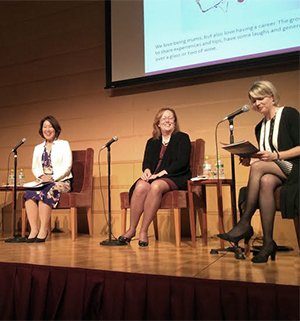- Attendees pledged to advance measures for equality
- Firms with a diverse leadership perform better than those without
- Addressing unconscious gender bias in the workplace needed

Female leaders joined a panel discussion.
On 8 March, International Women’s Day, business leaders, MBA students, volunteers, working and stay-at-home mums, as well as global and local entrepreneurs gathered at the Tokyo American Club in Minato Ward to celebrate the work of women around the world.
Dubbed “Spotlight on Japan: Recognizing the achievements of women and pledging to accelerate gender equality together”, the event was the first in a series designed to shine a light on important global and domestic topics affecting business in Japan.
Emily leRoux, founder of Mums in Business Tokyo and director at Michael Page Japan, was co-organiser of the event and master of ceremonies. Despite the widely reported challenges that women face in the workplace, the event was a celebration of the success of women at work, according to leRoux. She encouraged attendees to make a difference by being role models on a personal, professional, charitable and community level.
LeRoux’s address was followed by a panel discussion featuring Jody Ono of Hitotsubashi University ICS; Lauren Kawasaki of the lifestyle website Best Living Japan; Janelle Sasaki of Ernst & Young Advisory Co., Ltd.; and Lauren Shannon of Odigo Japan.
Ono cited studies dispelling the myth that there are differences in the effectiveness of leaders based on gender alone. It has been shown, she said, that an organisation’s structure, rather than the gender of its staff, can affect the effectiveness of a leader.
Further, a number of studies establish a link between a firm’s performance and its diversity of board membership. She asked if implementing laws on gender parity—as has been done in other countries—is the best policy for Japan, or whether a different path might be found.
Kawasaki said that, while quotas were not the solution to all workplace challenges, she was in favour of them. Some 15 firms in Japan have implemented the system.
Not only have they achieved greater profitability, but they have also welcomed fresh faces, resulting in an improvement in the diversity of the talent on their boards. Improvements have also been seen in the number of products and innovations. The great challenge, Kawasaki added, is to have more women in low- to mid-level management positions.
Sasaki met potential and current clients from about 80 organisations last year to discuss diversity and inclusion services. Some 90% had decided to set “aspirational levels” for gender parity. It was critical, she said, that these aspirations be implemented and managed with a strategy to ensure buy-in from all stakeholders.
Shannon added that, in those countries where quotas had been adopted in some areas, there were knock-on effects. For example, firms not required to adopt the system did so because it had become generally acceptable.
Citing further studies, Ono asked whether gender bias, which can be unconscious and include perceived roles for men and women, can be overcome.
Sasaki said addressing unconscious bias in the workplace in Japan—as in other countries—is the first step towards ensuring gender parity and inclusion. This is an area, she said, to which her firm is paying particular attention, including via awareness and skill-building programmes for clients.
Shannon, meanwhile, talked about the challenges of a lack of diversity in the tech start-up ecosystem. At Odigo, she has convinced the leadership to take proactive steps to recruit women developers, and to allow mothers in the firm to work remotely.
Kawasaki agreed, adding that, in her experience, having a system that relies on matrixes, including hiring and promotion criteria with clear standards, is a sound way to ensure fairness across an organisation.
In closing, Ono asked the audience to consider the importance of flexibility in the workplace and in society at large. This includes the need for more options for professionals to work reduced hours, and greater acceptance of entrepreneurship and of the choice to raise a family.


